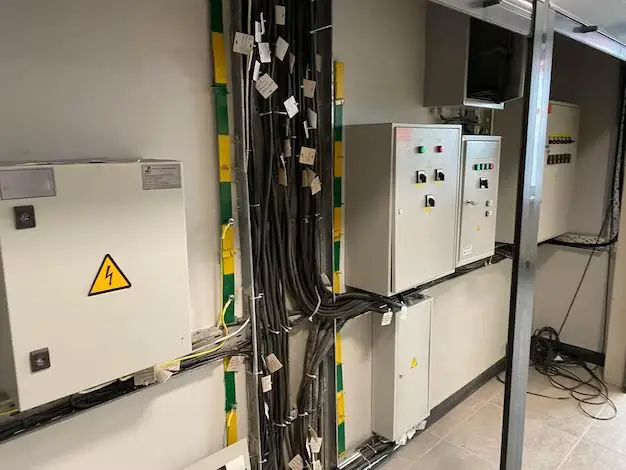Page Contents
What are electrical panels?
Electrical panels, also known as breaker boxes, are metal boxes that contain circuit breakers, fuses, and wire connections. The panel distributes electricity throughout the home. There are two main types of electrical panels – main breaker panels and fuse boxes.
Main breaker panels contain circuit breakers that trip and shut off power when there is an overload or short circuit in the wiring system. This helps prevent fires and damage to the electrical system. Fuse boxes contain fuses that burn out when there is an overload, cutting power to that circuit. Electrical panels are usually located outside the home or in basements, garages, utility rooms or closets.
Should you cover an electrical panel?
There are differing opinions on whether electrical panels should be covered or not. Some electricians recommend leaving panels uncovered so they can be easily accessed and inspected. However, there are some valid reasons why you may want to cover a panel:
Safety
Exposed electrical panels pose a safety risk, especially in homes with small children. Curious kids may stick items into the panel causing shorts, shocks or electrocution. Covering the panel helps prevent accidental contact and tampering. The National Electrical Code (NEC) does not require panels to be covered but recommends it for safety reasons.
Weatherproofing
Electrical components can be damaged by moisture, dirt, dust and insects getting into the panel. Covering the panel helps protect the circuit breakers and wiring from environmental contaminants. This helps prevent corrosion, shorts and other issues.
Aesthetics
Some homeowners cover panels simply because they look unsightly or detract from the home’s décor. Covering the panel allows it to better blend in with the wall or surroundings.
Is it code to cover electrical panels?
The NEC does not specifically require electrical panels to be covered. However, according to NEC section 110.28:
“Enclosures surrounding electrical service, feeder, or branch circuit panelboards shall be dead front type. Exposed live parts shall be enclosed on the front access side with non-ventilated covers.”
This means any live electrical components must be enclosed and protected from accidental contact. So while the code does not say panels must be covered, they should not be openly exposed. Local jurisdictions may have additional requirements. Some areas do require panels be covered for safety reasons.
What are the best ways to cover a panel?
If you choose to cover your electrical panel, here are safe options:
Metal Panel Cover
A metal panel cover is one of the best ways to cover the panel. It mounts securely over the panel and has a see-through window or opening so you can still read labels and see breakers. Metal covers are extremely durable and protect against any contact.
Plexiglass Cover
Plexiglass or plastic panel covers screw or mount over the panel to prevent contact. This lets you see into the panel without opening it. Plexiglass is weatherproof but can potentially shatter if impacted.
Decorative Panel Door
For a more aesthetic option, a decorative panel door or facade may be installed over the panel. This makes the panel blend in with the wall while still allowing access. The door would match cabinets, wallpaper or other décor while concealing the panel.
Cabinet
Some choose to enclose the entire panel within a nearby cabinet. This completely hides the panel behind a door while making it blend in seamlessly. The panel remains easily accessible by opening the cabinet door. Proper clearance space for opening the panel is still required.
Safety precautions when covering panels
If you do opt to cover an electrical panel, make sure it is done safely:
– Only use covers designed for electrical panels that properly fit your panel model.
– Do not permanently enclose or seal off the panel – it must remain accessible.
– Do not cover with fabric, paper or flammable materials. Use metal, plexiglass or wood.
– Do not cover ventilation openings or ducts around panel.
– Maintain clearance spaces specified by the manufacturer.
– A licensed electrician should install any fixed panel cover like a metal shroud.
Improper panel covers can limit ventilation, access and operation. This could cause overheating or prevent the panel door from opening. Only use sturdy, non-conductive materials cut to allow full access to the panel. Removable covers or doors are ideal in case the panel requires maintenance.
Conclusion
While the electrical code does not require covering panels, it can be a good idea in many homes. Appropriate covers can improve safety, weatherproofing and aesthetics. Just be sure any cover installed allows full access to the panel for maintenance and emergencies. It should be made of durable, non-combustible material. With proper installation and the right cover, panels can be concealed without preventing access or posing added risks. Consult an electrician to ensure it is done safely and correctly.
